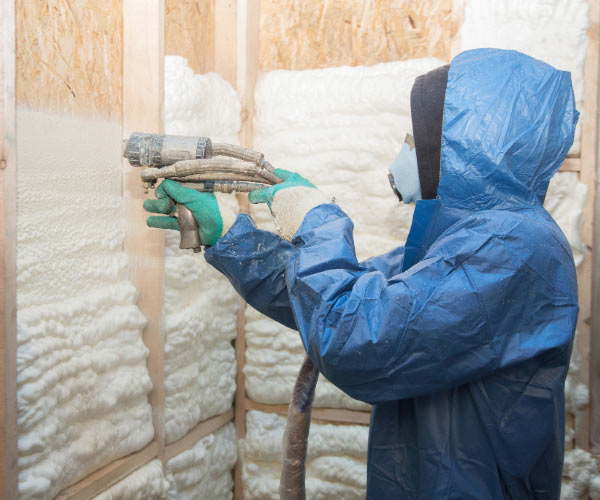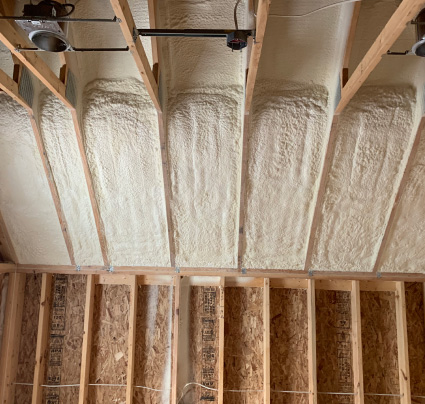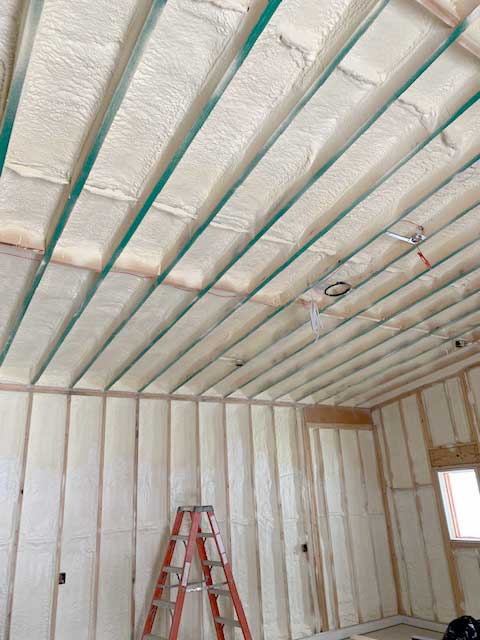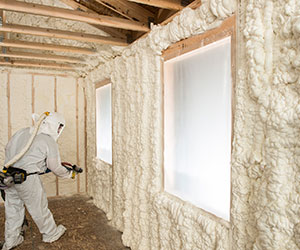Updated September 2024
Michigan’s climate presents unique challenges for homeowners. With harsh winters and humid summers, proper insulation is crucial for maintaining comfort and energy efficiency. In this post, we’ll explore how to determine the ideal spray foam insulation thickness for your Michigan home.
Cracking the Code: Understanding R-Value and Insulation Thickness

R-value measures an insulation’s thermal resistance. The higher the R-value, the better the insulation properties and insulating power. Michigan’s building codes specify minimum R-values for different areas of your home, such as walls, attics, and crawl spaces. These requirements vary based on climate zones within the state.
Spray foam insulation is one of the top choices for insulating local homes. Its unique expanding foam, two-in-one insulating and air sealing powers, and high R-value make it an ideal solution for many Michigan homeowners.
There are two types of spray foam insulation: open cell and closed cell. Open cell spray foam insulation typically has an R-value of approximately R-3.0 per inch, while closed cell spray foam offers approximately R-6.0 to R-7.0 per inch. This difference in insulation properties affects the recommended thickness for each type.
Thickness By Design: Factors Influencing Spray Foam Thickness
Climate zone
Michigan’s varied climate zones require different R-values. Northern regions may need thicker insulation to combat extreme temperatures.
Area of application
Different areas of your home require varying amounts of spray foam. Your attic, for instance, will need more insulation than your ceilings or crawl space.
Existing insulation
The presence of other insulation materials can impact your required spray foam thickness.
Energy efficiency goals
Homeowners seeking higher energy efficiency may opt for thicker insulation beyond minimum code requirements. Be careful though because thicker does not always mean better.
Reaping the Rewards: Benefits of Proper Insulation Thickness
Energy savings
Adequate insulation reduces heat transfer, lowering your energy bills and giving your HVAC system a much needed break.
Improved comfort
Consistent temperatures and reduced drafts create a more comfortable living environment.
Moisture control
Spray foam’s ability to create an air seal helps reduce moisture intrusion and potential mold growth.
Noise reduction
Proper insulation can dampen sound transmission, creating a quieter home for you and your family.
Too Little, Too Much: The Risks of Inadequate or Excessive Insulation
Insufficient insulation can lead to higher energy costs, discomfort, and potential moisture problems. Conversely, excessive insulation may be unnecessarily expensive and potentially trap moisture within your walls. Consulting with a qualified insulation contractor is crucial to determine the optimal spray foam insulation thickness for the specific needs of your Michigan home.
Mastering the Mitten State’s Unique Challenges: Michigan-Specific Considerations
 The Michigan Residential Code (MRC) outlines specific R-value requirements for homes in our state. Additionally, various energy efficiency programs and incentives are available to you and other fellow Michigan residents. Be sure to apply for every program and incentive you may qualify for to maximize your savings.
The Michigan Residential Code (MRC) outlines specific R-value requirements for homes in our state. Additionally, various energy efficiency programs and incentives are available to you and other fellow Michigan residents. Be sure to apply for every program and incentive you may qualify for to maximize your savings.
One of the most common insulation challenges you may encounter in our state is properly insulating your basement, crawl space, or “Michigan basement”, which are particularly susceptible to moisture issues in our often damp climate.
At Whitson Insulation, we specialize in spray foam insulation for Michigan’s unique climate. Our expertise ensures that your home is properly insulated to withstand the state’s extreme temperatures while maximizing energy efficiency.
Foam Fundamentals: Choosing the Right Spray Foam
 Closed cell spray foam is often recommended for exterior walls and roof decks due to its higher R-value and superior moisture resistance. Open cell spray foam insulation may be suitable for interior walls where some moisture permeability is desired.
Closed cell spray foam is often recommended for exterior walls and roof decks due to its higher R-value and superior moisture resistance. Open cell spray foam insulation may be suitable for interior walls where some moisture permeability is desired.
So, how thick does spray foam need to be? The recommended thickness varies based on the application:
- Walls: 2-3 inches of closed cell or 3 inches of open cell
- Ceilings and roof decks: 6-10 inches of open cell or 4-5 inches of closed cell
- Crawl spaces: 2-3 inches of closed cell to create a vapor barrier, air seal and thermal resistance.
Remember that these are general guidelines. The specific inch thickness required for your home may vary based on your home’s specific needs.
Your Partner in Spray Foam Insulation
Ready to optimize your home’s insulation? Our expert team at Whitson Insulation is here to assess your specific needs and recommend the ideal spray foam insulation thickness to keep your Michigan home comfortable and energy efficient year-round. Local homeowners and builders have counted on us for quality insulation and customer service since 1978 and you can too.
Don’t let you or your friend’s comfort and energy bills suffer from inadequate insulation. Contact us today for a free consultation and estimate. And share this post with local friends and family to help them create an air sealed, energy efficient home too!

